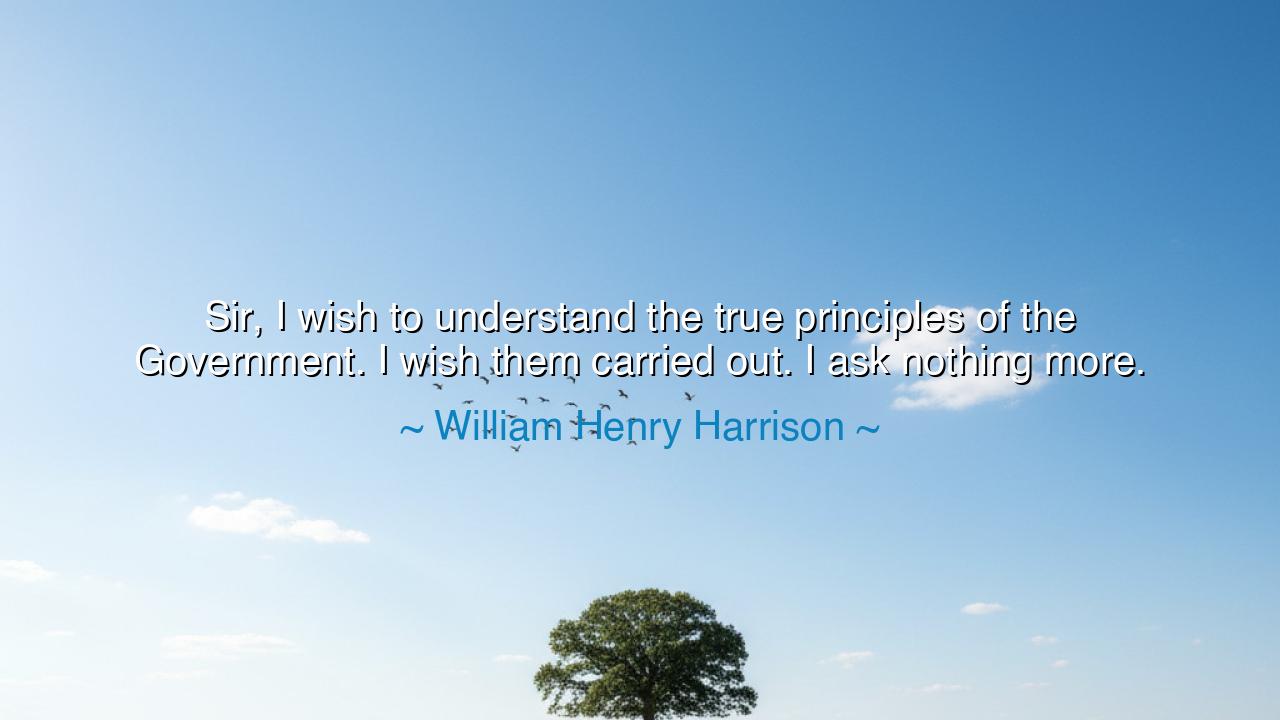
Sir, I wish to understand the true principles of the Government.
Sir, I wish to understand the true principles of the Government. I wish them carried out. I ask nothing more.






When William Henry Harrison declared, “Sir, I wish to understand the true principles of the Government. I wish them carried out. I ask nothing more,” he spoke as a man yearning not for power, but for purity of governance — for the noble spirit upon which his nation was founded. These words, drawn from a time when America was still young and its ideals still shimmering with promise, reveal a truth as eternal as the republic itself: that a government’s greatness lies not in its grandeur, but in its faithfulness to principle. Harrison’s voice, though soft in phrasing, carried the weight of a timeless demand — that those entrusted with authority must not twist the founding truths for gain, but must uphold them with integrity and humility.
The origin of this quote is rooted in the early 19th century, an era when America’s experiment in democracy was still being tested. Harrison, the ninth President of the United States, had lived through war, political division, and the slow shaping of a young nation’s soul. He spoke these words not as a partisan, but as a patriot — one who understood that liberty depends not merely on laws, but on the spirit in which those laws are applied. His plea was simple yet profound: to understand the true principles of government — justice, accountability, and service — and to carry them out without distortion. He asked for no favor, no wealth, no legacy beyond that which comes from fidelity to truth.
At its heart, the quote expresses the moral essence of republican virtue — that the highest calling of a citizen or leader is not to invent new doctrines, but to remain faithful to the eternal ones: liberty, equality before the law, and duty to the common good. Harrison’s words remind us that good government is not born from innovation alone, but from preservation — the preservation of principle amid the storms of ambition and corruption. In his voice we hear the echo of the Founding Fathers, men who risked everything to craft a system grounded not in tyranny, but in reason and moral order.
History has shown, however, how fragile that balance can be. Consider the story of Marcus Aurelius, the philosopher-emperor of ancient Rome, who sought to rule by reason and justice amid an empire bloated by power. Surrounded by flatterers and opportunists, Aurelius strove to live by principle — to govern not as a master but as a servant of the people. Yet even his wisdom could not save Rome from the decay that followed when later rulers abandoned virtue for indulgence. So too did Harrison understand that when government ceases to serve the governed, when leaders seek glory rather than goodness, the republic begins to wither from within. Principle without action is hypocrisy, and action without principle is chaos.
Harrison’s plea to “understand the true principles of the Government” also speaks to every generation’s responsibility to rediscover what freedom truly means. For in every age, the meaning of liberty is threatened by the slow drift of comfort and complacency. Nations forget the sacrifices that built them; citizens grow weary of vigilance. But as Harrison’s words remind us, the survival of freedom depends not on the memory of the founders, but on the understanding of the living. Each generation must reawaken to the truths of justice, representation, and moral restraint — and then carry them out, lest they vanish into mere rhetoric.
In his humility, Harrison gave voice to a profound political philosophy: that the principles of government must be greater than the passions of men. The statesman’s duty is not to shape truth to fit his ambition, but to shape himself to serve the truth. In this, he stands alongside figures like George Washington, who refused kingship so that the republic might remain free; and Abraham Lincoln, who clung to the Constitution even amid the agony of civil war. These were leaders who did not seek to rule above the law, but to embody it. Their power came not from dominion, but from devotion to principle.
The lesson of Harrison’s quote is thus both moral and eternal: that the measure of a government lies not in its size, its wealth, or its might, but in its faithfulness to the principles it professes. To understand those principles — and to live by them — is the highest form of patriotism. Every citizen, every leader, must strive to see clearly what is right and act upon it, even when it costs them comfort or acclaim.
So let his words echo as a challenge to all who govern and all who are governed: seek not power, but principle; not advantage, but understanding; not fame, but fidelity. For the republic that remembers its founding truths will endure, but the one that forgets them will perish. As Harrison said, “I ask nothing more” — for in the honest carrying out of truth, nothing more is needed. And therein lies the highest form of love for one’s country: not in words, but in faithful action rooted in eternal principle.






AAdministratorAdministrator
Welcome, honored guests. Please leave a comment, we will respond soon